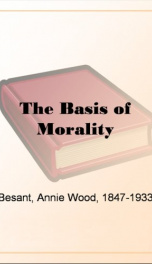An Introduction to Yoga

Purchase of this book includes free trial access to www.million-books.com where you can read more than a million books for free. This is an OCR edition with typos. Excerpt from book: LECTURE III. YOGA AS SCIENCE. Brothers: This afternoon, I propose to deal first with the two great methods of Yoga, one related to the Self and the other to the Not-Self. And let me remind you, ere I begin, that we are dealing only with the textit{science of Yoga and not with other means of attaining union with the Divine. The scientific method, following the old Indian conception, is the one to which I am asking your attention. I would remind you, however, that, though I am only dealing with this, there remain also the other two great ways of Bhakti and Karma ; the Yoga we are studying specially concerns the Marga of Jnanam, or knowledge, and within that way, within that Marga, or path, of knowledge, we find that three sub-divisions occur, as everywhere in nature. Methods Of Yoga. With regard to what I have just called the two great methods in Yoga, we find that by one ofthese a man treads the path of knowledge by buddl", textit{the pure reason, and the other the same path by manas the concrete mind. You may remember that in speaking yesterday of the sub-divisions of Antahkarana, I pointed out to you that there we had a process of reflexion of one quality in another ; and, within the limits of the cognitional aspect of the Self, you find buddhi, cognition reflected in cognition ; and ahamkara, cognition reflected in will ; and manas, cognition reflected m activity. Bearing those three sub-divisions in mind, you will very readily be able to see that these two methods of Yoga fall naturally under two of these heads. But what of the third ? What of the will, of which ahamkara is the representative in cognition ? That certainly has its road, but it can scarcely be said to be a ' method.' Will breaks its way upwards by sheer unflinching determination, keeping its eyes fix...
Info about the book
Author:
Series:
Unknown
ISBN:
0835671208
Rating:
1.5/5 (40)Your rating:
0/5
Languge:
English
Users who have this book
Users who want this book
What readers are saying
What do you think? Write your own comment on this book!
write a commentGenre
if you like An Introduction to Yoga try:
Do you want to exchange books? It’s EASY!
Get registered and find other users who want to give their favourite books to good hands!







